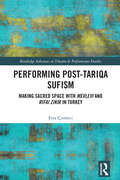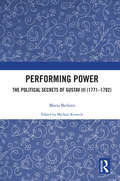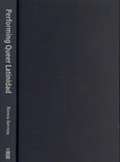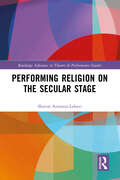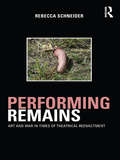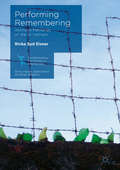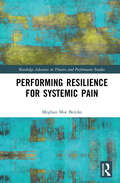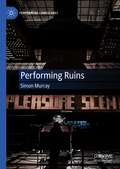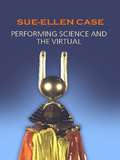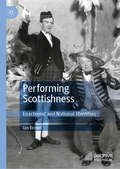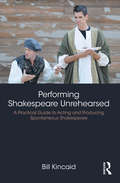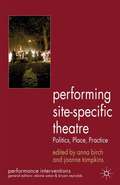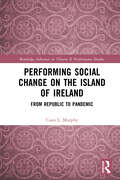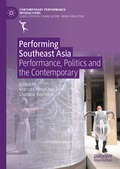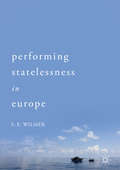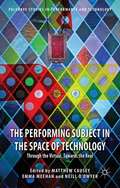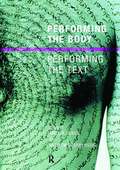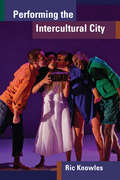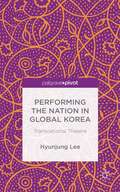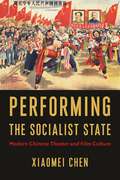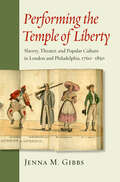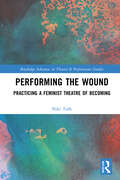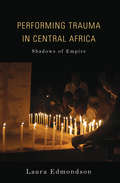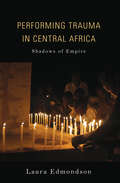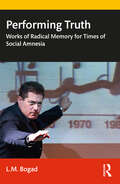- Table View
- List View
Performing Post-Tariqa Sufism: Making Sacred Space with Mevlevi and Rifai Zikir in Turkey (Routledge Advances in Theatre & Performance Studies)
by Esra ÇizmeciThis ethnographic research project examines the generation of post-tariqa Tasavvuf (Sufism: a spiritual practice and philosophy recognised as the inner dimension of Islam) in a variety of private, semi-public, public, secular and sacred urban spaces in present-day Turkey. Through extensive field research in minority Sufi communities, this book investigates how devotees of specific orders maintain, adapt, mobilise, and empower their beliefs and values through embodied acts of their Sufi followers. Using an ethnographic methodology and theories derived from performance studies, Esra Çizmeci examines the multiple ways in which the post-tariqa Mevlevi and Rifai practice is formed in present-day Turkey, such as through the authority of the spiritual teacher; the individual and collective performance of Sufi rituals; nefs (self) training; and, most importantly, the practice of Sufi doctrines in everyday life through the production of sacred spaces. Drawing on the theories of performance, she examines how the Sufi way of living and spaces are created anew in the process of each devotee’s embodied action. This book is informed by theories in performance studies, anthropology, religious studies, and cultural studies and places current Sufi practices in a historical perspective.
Performing Power: The Political Secrets of Gustav III (1771-1792)
by Maria BerlovaPerforming Power explores 18th-century fabrication of the royal image by focusing on the example of King Gustav III (1746–1792) – one of Sweden’s most acclaimed and controversial monarchs – who conspicuously chose theater as the primary media for his image-making and role construction. The text postulates that Gustav III was motivated by theater’s ability to aid him in fulfilling Enlightenment’s tenet of broadly educating the populace and inculcating it with royal ideology. That he was an amateur actor, stage director, and playwright were other engines driving his choice. The project challenges and expands the commonly accepted perception of Gustav III’s contribution to Swedish theater, which has generally been limited to founding its National Opera, developing its national drama, and forming its national dramatic repertoire. Maria Berlova presents Gustav III as a performing King who strategically used political events as a framework through which he could embody the image of the ideal or enlightened monarch as presented by Voltaire. Through this, Performing Power explores the tight relationship and complex bond between theatrical arts and politics. This unique study will be of great interest to students and scholars in theater studies, 18th-century culture, and politics.
Performing Queer Latinidad: Dance, Sexuality, Politics
by Rivera-Servera Ramón H.Performing Queer Latinidad highlights the critical role that performance played in the development of Latina/o queer public culture in the United States during the 1990s and early 2000s, a period when the size and influence of the Latina/o population was increasing alongside a growing scrutiny of the public spaces where latinidad could circulate. Performances---from concert dance and street protest to the choreographic strategies deployed by dancers at nightclubs---served as critical meeting points and practices through which LGBT and other nonnormative sex practitioners of Latin American descent (individuals with greatly differing cultures, histories of migration or annexation to the United States, and contemporary living conditions) encountered each other and forged social, cultural, and political bonds. At a time when latinidad ascended to the national public sphere in mainstream commercial and political venues and Latina/o public space was increasingly threatened by the redevelopment of urban centers and a revived anti-immigrant campaign, queer Latinas/os in places such as the Bronx, San Antonio, Austin, Phoenix, and Rochester, NY, returned to performance to claim spaces and ways of being that allowed their queerness and latinidad to coexist. These social events of performance and their attendant aesthetic communication strategies served as critical sites and tactics for creating and sustaining queer latinidad.
Performing Religion on the Secular Stage (Routledge Advances in Theatre & Performance Studies)
by Sharon Aronson-LehaviThis book examines the relations between Western religion, secularism, and modern theater and performance. Sharon Aronson-Lehavi posits that the ongoing cultural power of religious texts, icons, and ideas on the one hand and the artistic freedom enabled by secularism and avant-garde experimentalism on the other, has led theatre artists throughout the twentieth century to create a uniquely modern theatrical hybrid–theater performances that simultaneously re-inscribe and grapple with religion and religious performativity. The book compares this phenomenon with medieval forms of religious theater and offers deep and original analyses of significant contemporary works ranging from plays and performances by August Strindberg, Hugo Ball (Dada), Jerzy Grotowski, and Hanoch Levin, to those created by Adrienne Kennedy, Rina Yerushalmi, Deb Margolin, Milo Rau, and Sarah Ruhl. The book analyzes a new and original historiography of a uniquely modern theatrical phenomenon, a study that is of high importance considering the reemergence of religion in contemporary culture and politics.
Performing Remains: Art and War in Times of Theatrical Reenactment
by Rebecca Schneider'At last, the past has arrived! Performing Remains is Rebecca Schneider's authoritative statement on a major topic of interest to the field of theatre and performance studies. It extends and consolidates her pioneering contributions to the field through its interdisciplinary method, vivid writing, and stimulating polemic. Performing Remains has been eagerly awaited, and will be appreciated now and in the future for its rigorous investigations into the aesthetic and political potential of reenactments.' - Tavia Nyong'o, Tisch School of the Arts, New York University 'I have often wondered where the big, important, paradigm-changing book about re-enactment is: Schneider’s book seems to me to be that book. Her work is challenging, thoughtful and innovative and will set the agenda for study in a number of areas for the next decade.' - Jerome de Groot, University of Manchester Performing Remains is a dazzling new study exploring the role of the fake, the false and the faux in contemporary performance. Rebecca Schneider argues passionately that performance can be engaged as what remains, rather than what disappears. Across seven essays, Schneider presents a forensic and unique examination of both contemporary and historical performance, drawing on a variety of elucidating sources including the "America" plays of Linda Mussmann and Suzan-Lori Parks, performances of Marina Abramovic´ and Allison Smith, and the continued popular appeal of Civil War reenactments. Performing Remains questions the importance of representation throughout history and today, while boldly reassessing the ritual value of failure to recapture the past and recreate the "original."
Performing Remembering: Women's Memories of War in Vietnam (Contemporary Performance InterActions)
by Rivka Syd EisnerThis book explores the performances and politics of memory among a group of women war veterans in Ho Chi Minh City, Vietnam. Through ethnographic, oral history-based research, it connects the veterans’ wartime histories, memory politics, performance practices, recollections of imprisonment and torture, and social activism with broader questions of how to understand and attend to continuing transgenerational violence and trauma. With an extensive introduction and subsequent chapters devoted to in-depth analysis of four women’s remarkable life stories, the book explores the performance and performativity of culture; ethnographic oral history practice; personal, collective, and (trans)cultural memory; and the politics of postwar trauma, witnessing, and redress. Through the veterans’ dynamic practices of prospective remembering, 'pain-taking', and enduring optimism, it offers new insights into matrices of performance vital to the shared work of social transformation. It will appeal to readers interested in performance studies, memory studies, gender studies, Vietnamese studies, and oral history.
Performing Resilience for Systemic Pain (Routledge Advances in Theatre & Performance Studies)
by Meghan Moe BeitiksHow might performance serve as a means for facing ubiquitous trauma and pain, in humans and ecologies? While reflecting on her multidisciplinary work Systems of Pain/Networks of Resilience, artist Meghan Moe Beitiks considers bodies of knowledge in Trauma Theory, Intersectional Feminist Philosophy, Ecology, Disability Studies, New Materialism, Object-Oriented Ontology, Gender Studies, Artistic Research, Psychology, Performance Studies, Social Justice, Performance Philosophy, Performance Art, and a series of first-person interviews in an attempt to answer that question. Beitiks brings us through the first-person process of making the work and the real-life, embodied encounters with the theories explored within it as an expansion of the work itself. Facing down difficult issues like trauma, discrimination, and the vulnerability of the body, Beitiks looks to commonalities across species and disciplines as means of developing resilience and cultivating communities. Rather than paint a picture of glorious potential utopias, Beitiks takes a hard look at herself as an embodiment of the values explored in the work, and stays with the difficult, sucky, troubling, work to be done. Performing Resilience for Systemic Pain is a vulnerable book about the quiet presence and hard looking needed to shift systems away from their oppressive, destructive realities.
Performing Ruins (Performing Landscapes)
by Simon MurrayThis book engages with the relationship between ruins, dilapidation, and abandonment and cultural events performed within such spaces. Following the author’s fieldwork in the UK, Bosnia Herzegovina, Poland, Germany, Greece, and Sicily, chapters describe, investigate, and reflect upon live performance events which have taken place in sites of decay and abandonment. The book’s main focus is upon modern economic ruins and ruins of warfare. Each chapter provides several case studies based upon the author’s own site visits and interviews with actors, directors, producers, curators, writers, and other artists. The book contextualises these events within the wider framework of Ruin Studies and provides brief summaries of how we might understand the ruin in terms of time, politics, culture, and atmospheres. The book is particularly preoccupied with artists’ reasons and motivations for placing performance events in ruined spaces and how these work dramaturgically.
Performing Science and the Virtual
by Sue-Ellen CaseThis impressive new book from Sue-Ellen Case looks at how science has been performed throughout history, tracing a line from nineteenth century alchemy to the twenty-first century virtual avatar. In this bold and wide-ranging book that is written using a crossbreed of styles, we encounter a glance of Edison in his laboratory, enter the soundscape of John Cage and raid tombs with Lara Croft. Case looks at the intersection of science and performance, the academic treatment of classical plays and internet-like bytes on contemporary issues and experiments where the array of performances include: electronic music Sun Ra, the jazz musician the recursive play of tape from Samuel Beckett to Pauline Oliveros Performing Science and the Virtual reviews how well these performances borrow from spiritualist notions of transcendence, as well as the social codes of race, gender and economic exchange. This book will appeal to academics and graduates studying theatre and performance studies, cultural studies and philosophy.
Performing Scottishness: Enactment and National Identities
by Ian BrownThis wide-ranging and ground-breaking book, especially relevant given Brexit and renewed Scottish independence campaigning, provides in-depth analysis of ways Scottishness has been performed and modified over the centuries. Alongside theatre, television, comedy, and film, it explores performativity in public events, Anglo-Scottish relations, language and literary practice, the Scottish diaspora and concepts of nation, borders and hybridity. Following discussion of the 1320 Declaration of Arbroath and the real meanings of the 1706/7 Treaty of Union, it examines the differing perceptions of what the ‘United Kingdom’ means to Scots and English. It contrasts the treatment of Shakespeare and Burns as ‘national bards’ and considers the implications of Scottish scholars’ invention of ‘English Literature’. It engages with Scotland’s language politics –rebutting claims of a ‘Gaelic Gestapo’ – and how borders within Scotland interact. It replaces myths about ‘tartan monsters’ with level-headed evidence before discussing in detail representations of Scottishness in domestic and international media.
Performing Shakespeare Unrehearsed: A Practical Guide to Acting and Producing Spontaneous Shakespeare
by Bill KincaidPerforming Shakespeare Unrehearsed: A Practical Guide to Acting and Producing Spontaneous Shakespeare outlines how Shakespeare’s plays can be performed effectively without rehearsal, if all the actors understand a set of performance guidelines and put them into practice. Each chapter is devoted to a specific guideline, demonstrating through examples how it can be applied to pieces of text from Shakespeare’s First Folio, how it creates blocking and stage business, and how it enhances story clarity. Once the guidelines have been established, practical means of production are discussed, providing the reader with sufficient step-by-step instruction to prepare for Unrehearsed performances. This book is written for the actor and performer.
Performing Site-Specific Theatre
by Anna Birch Joanne TompkinsThis book investigates the expanding parameters for site-specific performance to account for the form's increasing popularity in the twenty-first century. Leading practitioners and theorists interrogate issues of performance and site to broaden our understanding of the role that place plays in performance and the ways that performance influences it
Performing Social Change on the Island of Ireland: From Republic to Pandemic (Routledge Advances in Theatre & Performance Studies)
by Ciara L. MurphyThis book examines the relationship between moments of significant social change on the island of Ireland and performance practice during the twentieth and twenty-first centuries. It examines how moments of significant change influence not only the content of performance practice but also the form and function of theatre production and reception. This book investigates how the Troubles and subsequent Peace Process, Second-Wave Feminism, the Celtic Tiger and neoliberalism, social revolution, and the COVID-19 pandemic impacts the form and function of performance practice across the island of Ireland. Although these forms of theatre and performance making refer to varied and distinct lineages of practice internationally, there are key parallels that compel a study of their inter-relationality in a specific Irish context This book explores how the performance of Ireland illuminates histories and stories that are on the margins, illuminating the lived realities of everyday life through the presentation of moments of violence, oppression, and trauma as something that is as important as the larger narratives often ascribed to nationhood. This book asks how performance practice engages with and informs moments of major social change on the island of Ireland through the distinct yet intersecting lenses of place, performance form, and social context over the course of almost a century of Irish theatre and performance practice.
Performing Southeast Asia: Performance, Politics and the Contemporary (Contemporary Performance InterActions)
by Marcus Cheng Chye Tan Charlene Rajendran"Performing Southeast Asia: Performance, Politics and the Contemporary is an important reconsideration of the histories and practices of theatre and performance in a fluid and dynamic region that is also experiencing an overarching politics of complexity, precarity and populist authoritarian tendencies. In a substantial introductory essay and essays by leading scholars, activists and practitioners working inside the region, the book explores fundamental questions for the arts. The book asks how theatre contributes to and/or addresses the political condition in the contemporary moment, how does it represent the complexity of experiences in peoples’ daily lives and how does theatre engage in forms of political activism and enable a diversity of voices to flourish. The book shows how, in an age of increasingly violent politics, political institutions become sites for bad actors and propaganda. Forces of biopolitics, neo-liberalism and religious and ethnic nationalism intersect in unpredictable ways with decolonial practices – all of which the book argues are forces that define the contemporary moment. Indeed, by putting the focus on contemporary politics in the region alongside the diversity of practices in contemporary theatre, we see a substantial reformation of the idea of the contemporary moment, not as a cosmopolitan and elite artistic practice but as a multivalent agent of change in both aesthetic and political terms. With its focus on community activism and the creative possibilities of the performing arts the region, Performing Southeast Asia, is a timely intervention that brings us to a new understanding of how contemporary Southeast Asia has become a site of contest, struggle and reinvention of the relations between the arts and society." - Peter Eckersall, The Graduate Center, City University of New York, USA "Performing Southeast Asia – with chapters concerned with how regional theatres seek contextually-grounded, yet post-national(istic) forms; how history and tradition shape but do not hold down contemporary theatre; and how, in the editors’ words, such artistic encounters could result in theatres ‘that do not merely attend to matters of cultural heritage, tradition or history, but instead engage overtly with theatre and performance in the contemporary’ – contributes to the possibility of understanding what options for an artistically transubstantiated now-ness may be: to the possibility, that is, of what might be called a ‘Present-Tense Theatre’." - C. J. W.-L. Wee, Professor of English, Nanyang Technological University, SingaporeThis book examines contemporary performance practices and politics in Southeast Asia. It analyses performances created and performed in Southeast Asia, with specific focus on particular nation states, as these engage the volatile or shifting cultures and politics that inform contemporary life, particularly in urban Southeast Asia. In a region haunted historically by political divergence, authoritarianism and militarism, religious diversity and ethnic strife, the chapters reveal how contemporary performance, and performances today reflect yet challenge dominant socio-political discourses. The authors centre their discussion on the efficacies of performance as political intervention in Southeast Asia in a time of seismic socio-political change. They consider issues of state hegemonies, censorship, the resurgence of authoritarianism, the persistence of history and tradition, the impact of finance and sponsorship, social liberalism and conservatism and globalisation and cultural practice.
Performing Statelessness in Europe
by S. E. WilmerThis book examines performative strategies that contest nationalist prejudices in representing the conditions of refugees, the stateless and the dispossessed. In the light of the European Union failing to find a political solution to the current migration crisis, it considers a variety of artistic works that have challenged the deficiencies in governmental and transnational practices, as well as innovative efforts by migrants and their hosts to imagine and build a new future. It discusses a diverse range of performative strategies, moving from a consideration of recent adaptations of Greek tragedy, to performances employing fictive identification, documentary dramas, immersive theatre, over-identification and subversive identification, nomadism and political activism. This study will appeal to those interested in questions of statelessness, migration, and the problematic role of the nation-state.
The Performing Subject in the Space of Technology
by Matthew CauseyNow that the shock of the virtual has subsided toward a 'new-normal' of computational interference in all areas of life, it is an advantageous moment to reflect on the passage through the virtual and back to the real. Digital culture has developed into a bio-virtual environment in which the categories of the biological and the virtual no longer stand as separate. The contributors to this volume respond to the questions raised by the 'after-event' of the digital through practice-led researchanalyses of performance processes, philosophical readings of the work of art and technology, and performance studies investigations of the subject in the spaces of technology. The volume examines a wide range of activities, from bio-art to internet child pornography, gaming and social networking technologies to the use of motion-tracking in developing choreography and documentation. The authors draw from diverse perspectives in dance, theatre, performance, film and music studies, digital arts and culture.
Performing the Body/Performing the Text
by Amelia Jones Andrew StephensonThis book explores the new performativity in art theory and practice, examining ways of rethinking interpretive processes in visual culture. Since the 1960s, visual art practices - from body art to minimalism - have taken contemporary art outside the museum and gallery; by embracing theatricality and performance and exploding the boundaries set by traditional art criticism. The contributors argue that interpretation needs to be recognised as much more dynamic and contingent. Offering its own performance script, and embracing both canonical fine artists such as Manet, De Kooning and Jasper Johns, and performance artists such as Vito Acconci and Gunter Brus, this book offers radical re-readings of art works and points confidently towards new models for understanding art.
Performing the Intercultural City
by Ric KnowlesIn 1971, Canada became the first country to adopt an official policy of multiculturalism. Performing the Intercultural City explores how Toronto—a representative global city in this multicultural country—stages diversity through its many intercultural theater companies and troupes. The book begins with a theoretical introduction to theatrical interculturalism. Subsequent chapters outline the historical and political context within which intercultural performance takes place; examine the ways in which Indigenous, Filipino, and Afro-Caribbean Canadian theater has developed play structures based on culturally specific forms of expression; and explore the ways that intercultural companies have used intermediality, modernist form, and intercultural discourse to mediate across cultures. Performing the Intercultural City will appeal to scholars, artists, and the theater-going public, including those in theater and performance studies, urban studies, critical multiculturalism studies, diaspora studies, critical cosmopolitanism studies, critical race theory, and cultural studies.
Performing the Nation in Global Korea: Transnational Theatre
by Hyunjung LeeThis book illustrates how local awareness of Western cultural hegemonic entities such as Broadway and Shakespeare have been implemented within South Korean theatre in the global era. With a focus on performances that targeted global audiences, Lee explores the ways in which Korea's nationalistic desires for global visibility are projected on stage.
Performing the Socialist State: Modern Chinese Theater and Film Culture
by Xiaomei ChenPerforming the Socialist State offers an innovative account of the origins, evolution, and legacies of key trends in twentieth-century Chinese theater. Instead of seeing the Republican, high socialist, and postsocialist periods as radically distinct, it identifies key continuities in theatrical practices and shared aspirations for the social role and artistic achievements of performance across eras.Xiaomei Chen focuses on the long and remarkable careers of three founders of modern Chinese theater and film, Tian Han, Hong Shen, and Ouyang Yuqian, and their legacy, which helped shape theater cultures into the twenty-first century. They introduced Western plays and theories, adapted traditional Chinese operas, and helped develop a tradition of leftist theater in the Republican period that paved the way for the construction of a socialist canon after 1949. Chen investigates how their visions for a free, democratic China fared in the initial years after the founding of the People’s Republic, briefly thriving only to founder as artists had to adapt to the Communist Party’s demand to produce ideologically correct works. Bridging the faith play and “antiparty plays” of the 1950s, the “red classics” of the 1960s, and their reincarnations in the postsocialist period, she considers the transformations of the depictions of women, peasants, soldiers, scientists, and revolutionary history in plays, operas, and films and examines how the market economy, collective memories, star culture, social networks, and state sponsorship affected dramatic productions.Countering the view that state interference stifles artistic imagination, Chen argues that theater professionals have skillfully navigated shifting ruling ideologies to create works that are politically acceptable yet aesthetically ingenious. Emphasizing the power, dynamics, and complexities of Chinese performance cultures, Performing the Socialist State has implications spanning global theater, comparative literature, political and social histories, and Chinese cultural studies.
Performing the Temple of Liberty: Slavery, Theater, and Popular Culture in London and Philadelphia, 1760–1850 (Early America: History, Context, Culture)
by Jenna M. GibbsHow popular theater, including blackface characters, reflected and influenced attitudes toward race, the slave trade, and ideas of liberty in early America.Jenna M. Gibbs explores the world of theatrical and related print production on both sides of the Atlantic in an age of remarkable political and social change. Her deeply researched study of working-class and middling entertainment covers the period of the American Revolution through the first half of the nineteenth century, examining controversies over the place of black people in the Anglo-American moral imagination. Taking a transatlantic and nearly century-long view, Performing the Temple of Liberty draws on a wide range of performed texts as well as ephemera—broadsides, ballads, and cartoons—and traces changes in white racial attitudes.Gibbs asks how popular entertainment incorporated and helped define concepts of liberty, natural rights, the nature of blackness, and the evils of slavery while also generating widespread acceptance, in America and in Great Britain, of blackface performance as a form of racial ridicule. Readers follow the migration of theatrical texts, images, and performers between London and Philadelphia. The story is not flattering to either the United States or Great Britain. Gibbs's account demonstrates how British portrayals of Africans ran to the sympathetic and to a definition of liberty that produced slave manumission in 1833 yet reflected an increasingly racialized sense of cultural superiority. On the American stage, the treatment of blacks devolved into a denigrating, patronizing view embedded both in blackface burlesque and in the idea of "Liberty," the figure of the white goddess.Performing the Temple of Liberty will appeal to readers across disciplinary lines of history, literature, theater history, and culture studies. Scholars and students interested in slavery and abolition, British and American politics and culture, and Atlantic history will also take an interest in this provocative work.
Performing the Wound: Practicing a Feminist Theatre of Becoming (Routledge Advances in Theatre & Performance Studies)
by Niki TulkThis book offers a matrixial, feminist-centered analysis of trauma and performance, through examining the work of three artists: Ann Hamilton, Renée Green, and Cecilia Vicuña. Each artist engages in a multi-media, or “combination” performance practice; this includes the use of site, embodied performance, material elements, film, and writing. Each case study involves traumatic content, including the legacy of slavery, child sexual abuse and environmental degradation; each artist constructs an aesthetic milieu that invites rather than immerses—this allows an audience to have agency, as well as multiple pathways into their engagement with the art. The author Niki Tulk suggests that these works facilitate an audience-performance relationship based on the concept of ethical witnessing/wit(h)nessing, in which viewers are not positioned as voyeurs, nor made to risk re-traumatization by being forced to view traumatic events re-played on stage. This approach also allows agency to the art itself, in that an ethical space is created where the art is not objectified or looked at—but joined with. Foundational to this investigation are the writings of Bracha L. Ettinger, Jill Bennett and Diana Taylor—particularly Ettinger’s concepts of the matrixial, carriance and border-linking. These artists and scholars present a capacity to expand and articulate answers to questions regarding how to make performance that remains compelling and truthful to the trauma experience, but not re-traumatizing. This study will be of great interest to students and scholars of performance studies, art history, visual arts, feminist studies, theatre, film, performance art, postcolonialism, rhetoric and writing.
Performing Trauma in Central Africa: Shadows of Empire (African Expressive Cultures)
by Laura EdmondsonWhat are the stakes of performance in a time of war? How is artistic expression prone to manipulation by the state and international humanitarian organizations? From the standpoint of empire, Laura Edmondson explores cultural production that responds to the 1994 genocide in Rwanda, the twenty-year civil war in northern Uganda, and regional conflict in the eastern part of the Democratic Republic of the Congo. She examines memorial ceremonies, plays, indigenous performance, NGO media campaigns, and contemporary dance to reveal how artists and cultural workers challenge state and humanitarian narratives in the shadow of empire and how empire, in turn, infiltrates creative capacities. Carefully contextualizing these narratives within the charged political terrain of the Great Lakes Region, Edmondson deepens our understanding of the role of creative expression and cultural agency in conflict and postconflict zones.
Performing Trauma in Central Africa: Shadows of Empire (African Expressive Cultures)
by Laura Edmondson“An outstanding addition to the literature on theatre and performance in situations of conflict and post-conflict.” —New Theatre QuarterlyWhat are the stakes of cultural production in a time of war? How is artistic expression prone to manipulation by the state and international humanitarian organizations? In the charged political terrain of post-genocide Rwanda, post-civil war Uganda, and recent violence in the Democratic Republic of Congo, Laura Edmondson explores performance through the lens of empire.Instead of celebrating theatre productions as expression of cultural agency and resilience, Edmondson traces their humanitarian imperatives to a place where global narratives of violence take precedence over local traditions and audiences. Working at the intersection of performance and trauma, Edmondson reveals how artists and cultural workers manipulate narratives in the shadow of empire and how empire, in turn, infiltrates creative capacities.
Performing Truth: Works of Radical Memory for Times of Social Amnesia
by L.M. BogadPerforming Truth answers the most pressing questions facing any theatre-makers who are wrestling with how to present historical, political or socioeconomic information in an engaging, entertaining, and galvanizing way. How to make data compelling and documents mobilizing? How to keep an audience interested in what might be dry, dire, or depressing? How to surprise an audience and keep them alert? Collecting together the performance texts of international performance artist and activist L.M. Bogad, this book accompanies each script with essays that further explore that work's performance strategies. It also equips readers with specific resources and pedagogical tools to help those wishing to stage these pieces or create their own work to engage with similar topics. Bogad also provides "takeaways" for each piece, illustrating the challenges of its particular subject matter and how to overcome those challenges with innovations unique to performance art. This is a key guidebook for artists and theatre-makers facing the challenges of engaging with information in an era of fake news, propaganda bots, and the polarization of ideological spheres, as well as students and teachers taking on that challenge in theatre studies, performance studies and performing arts classrooms.
